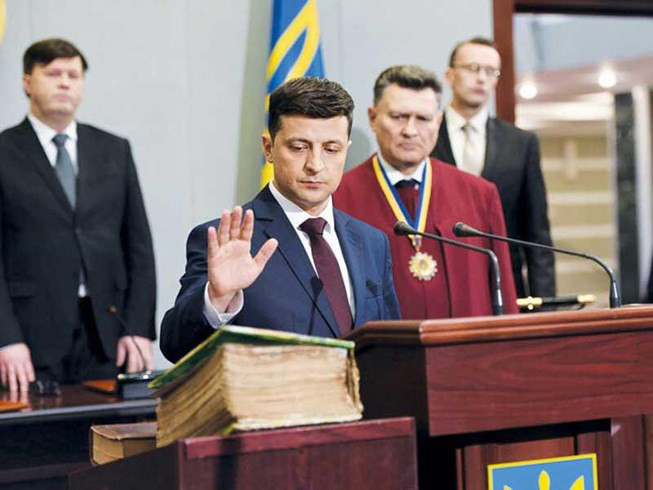Opportunity for new Ukrainian President to consolidate power
By calling for early elections, Mr. Zelensky hopes to create a big wave "to sweep away the old regime's parliamentarians and replace them with new blood for the new Parliament."
Ukrainian voters went to the polls today (July 21) to elect a new parliament. This early election is seen as an opportunity for new Ukrainian President Zelensky to consolidate power and implement the reforms he introduced in the presidential election last April.
|
| New Ukrainian President Zelensky. Photo: AFP. |
According to the schedule, the Ukrainian parliamentary election will take place at the end of October. However, on the day of his inauguration on May 21, new President Zelensky announced the dissolution of parliament and called for early elections.
Despite becoming President after a resounding victory last April, the new President Zelensky has not been able to appoint the Ministers he wants. Because, according to Ukrainian law, the President must share power with the Parliament to form a new Government as well as propose a new Prime Minister for the country.
Ukraine’s outgoing parliament is now dominated by members of former President Poroshenko’s European Solidarity Party, which “dislikes” Mr. Zelensky. Mr. Zelensky’s resounding victory in Ukraine’s presidential election last April was seen as a “rejection” of the Ukrainian political elite for failing to improve living standards, rid the country of corruption, and end the conflict with the opposition in eastern Ukraine.
By calling for early elections, Mr. Zelensky hopes to create a big wave of “sweeping out the old regime’s parliamentarians and replacing them with new ones”, thereby helping him consolidate power and gain more authority to reform the country. According to the BBC, only if President Zelensky’s “Servant of the People” party is strong enough can it help him consolidate power and carry out the reforms he desires, otherwise his next 5-year term will be extremely difficult.
“Ukraine is facing two difficult problems,” said Iryna Bekeshkina, director of the Ukrainian Foundation for Democracy. “One is to harmonize relations with Russia and the second is to strive to become a truly European country, which includes dealing with corruption. This is something that previous regimes were unable to do.”
In this election, Ukrainian voters will elect 424 MPs from 5,845 candidates from 22 different parties. Pre-election polls show that President Zelensky's Servant of the People party is leading with more than 40% of the votes. In second place is the Opposition Platform party with about 12% of the votes. Former President Poroshenko's European Solidarity party is likely to win about 8% of the votes. In fourth place is Yulia Tymoshenko's Batkivshchyna (Motherland) party with more than 7% of the votes. Many voters said they want to give the President more opportunities to carry out reforms in the country.
Some voters said:
"I vote to end corruption in the country. I vote for young people. We are fed up with professional politicians."
"I came to vote for the Servant of the People party to give Mr. Zelensky another chance to fulfill his commitments to us, to have partners who can bring about the change we want."
However, according to analysts, despite winning many votes, the Servant of the People party is unlikely to win a majority. The balance of power in Ukraine's new parliament will depend on the coalition between parties. According to analysts, about 50 to 70% of the elected MPs in this election will be new MPs. Among the 5 leading political parties in pre-election polls, there are 2 newly formed parties: Mr. Zelensky's party and the Voice party of rock star Svyatoslav Vakarchuk. Most of the members of these 2 newly formed parties are "newcomers to politics" including businessmen, athletes and activists and they are 37 years old.
Polling stations opened at 8am on July 21 (local time) and will close 12 hours later. The results of the vote will be announced soon./.


